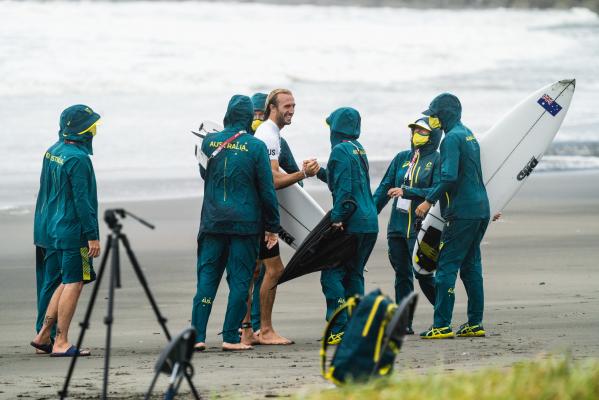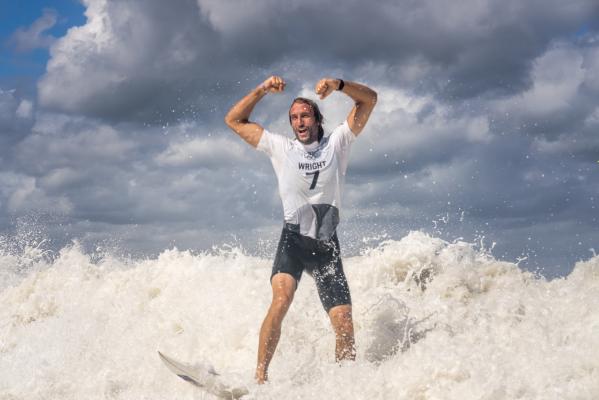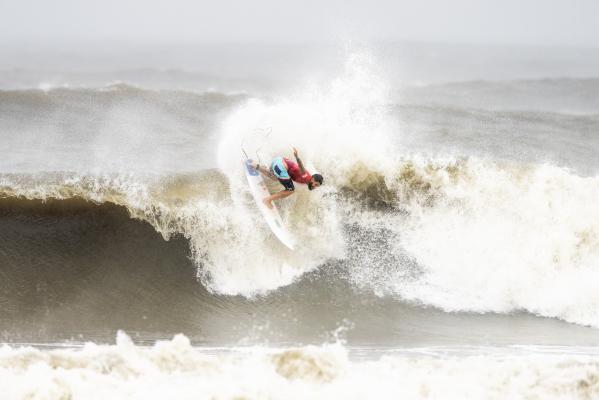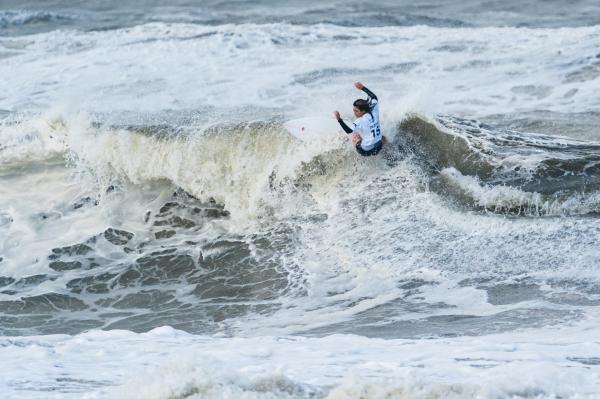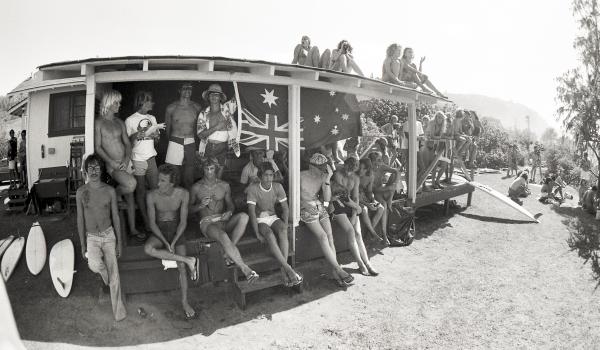We scrambled on deadline day last week and managed to get the results and a brief recap of a momentous finals day at surfing’s Olympic debut at Shidashita Beach into this space, but there was no time to really capture the mood of the moment.
Well, in the days that followed, social media threads revealed that despite the Olympic dream having polarised the surfing community for decades, and despite its Japanese debut being conducted in mostly rubbish conditions, we actually liked it. No, we loved it! It had drama, pathos, humour, great and gutsy performances, and Barton Lynch going bananas in the commentary booth.
And while the results of the Aussie team were no match for our wonder girls in the pool, we made it to the podium! I don’t think coming third has ever meant so much to Owen Wright, but this was Olympic bronze, and the big bloke was so awash with emotion when he beat Brazil’s Gabby Medina for the medal that he probably couldn’t taste the chemicals in the grey Shidashita water as he completed his victory lap.
The bronze in the women’s was equally emotional, with homegirl Amuro Tsuzuki putting on a world-class display of clean, rail-driven surfing. The low seed methodically worked her way through the best in the business to get to the podium, and her medal was thoroughly deserved. Likewise, Japanese Californian Kanoa Igarashi, silver in the men’s, who surfed brilliantly up to the final.
In the big, messy surf of finals day, reigning world champs Carissa Moore and Italo Ferreira unsurprisingly breezed to victory, but what did come as a surprise was that Italo won it with his rail game rather than spectacular airs. This may have had more to do with the subtle wind shift ahead of the final, or Italo may have just been showing off.
The brilliant Carissa Moore dusted courageous South African Bianca Buitendag in a one-sided final and couldn’t contain her emotions at the podium, but the only ethnic Hawaiian in the event also found herself reluctantly drawn into an old debate given a fresh airing by the Associated Press.
While I sympathise with the views of the Native Hawaiians about what some of them see as the subjugation of their surfing heritage by the surf industry, the Olympic movement and everyone else, this article really annoyed me, both for its tone and its inaccuracies. Under the heading, “Olympic surfing exposes whitewashed Native Hawaiian roots”, writer Sally Ho dredged up the narrative that we’ve been hearing since the ‘70s.
She wrote: “For some Native Hawaiians, surfing’s Olympic debut is both a celebration of a cultural touchstone invented by their ancestors, and an extension of the racial indignities seared into the history of the game and their homeland.”
She quoted: ‘“You had Native Hawaiians in the background being a part of the development of it and just not being really recognised,” said Isaiah Helekunihi Walker, a Hawaii historian and activist. “There’s an element of them taking over. That’s when there’s no more aloha.”’
Walker has been beating this drum since the publication of his book, Waves of Resistance, in 2011, and even then it was just an old story in a new context. Hawaiian nationalism has been an issue since American annexation in 1898 when the sugar barons pressured the US government to act to protect their interests. Having been stripped of their traditions, including surfing, by the missionaries, the Hawaiians were now robbed of self-determination. They had every right to fight back.
But elements of the story over the last 50 years are just plain wrong. I know, I was there.
Ho writes: “The Native Hawaiians never gave up their sport and by the 1970s, there was a full-blown racial clash around surfing with well-documented fights in the ocean. The issue pitted Native Hawaiians and some white residents who grew up among them against the white Californian and Australian surfers who sought to exclude locals from the world’s best waves on their very own turf.
No they didn’t. It was the other way round.
Ho continues: “An infamous brawl involved a trash-talking Australian surfer named Wayne ‘Rabbit’ Bartholomew, who was battered and humbled by the locals. The surfing world’s reverence for Hawaii and Native Hawaiians was cemented.”
So reverence for things Hawaiian is “cemented” by a bunch of thugs (some of them Hawaiian) beating a solitary surfer to a pulp! Rabbit, who went on to win a world title and lead the sport’s governing body, was deeply affected, mentally as well as physically, by the savage beating, but he rose above it. Yes, he was a bit of a mug lair in those days, and a bit of a drop-in, but when it came to taking every wave on offer, he wasn’t in the same league as the locals, the masters of the game.
Ho concludes: “The effort to take back surfing’s narrative is why sovereignty activists applied for a Hawaii Kingdom national team to compete at the Olympics. Their long shot request hinges on the fact that they say there was no ratified treaty that ever formally dissolved Hawaii’s autonomy.”
Rejecting the application, the International Olympic Committee noted only that applicants must be an “independent state recognised by the international community.”
It takes a lot to move the wheels of the IOC, but the World Surf League already does this, with American and ethnic Hawaiians competing on the world stage under the Hawaiian flag. Perhaps by Paris 2024, when the surfing events will be held in Tahiti, more pressure will be brought to bear, since Tahitian surfer Michel Bourez had to compete this year under the French flag.
In the meantime, I’m sure the majority of Hawaiian surfers of all racial mixes will be rejoicing over Carissa Moore’s triumphant gold.

